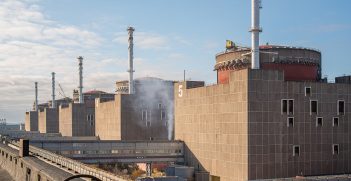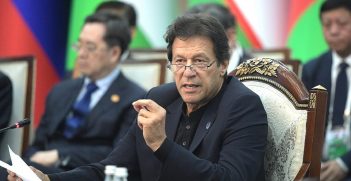Inflation Troubles, OPEC Raises Oil Prices, and France's Macron Gets Busy in China

The twin dilemma’s of high inflation and high oil prices have put many nations in a tight bind. Meanwhile, in China, far from addressing the elephant of Russia in the room, France signals new partnerships with Beijing.
Australia, along with all G7 countries, OECD members, and a cluster of the richest G20 nations are facing a huge bill to bail out the world’s most impoverished nations. They are the countries hardest hit by the recent wave of inflation, exacerbated by a renewed surge in oil prices engineered by Saudi Arabia and the United Arab Emirates.
The figures emerged on the eve of the annual six-day policy-making meetings of the International Monetary Fund (IMF) and World Bank in Washington, attended by finance ministers and central bankers, and watched closely by the financial community. The report, the result of a a study by the campaign group Debt Justice, says that 91 of the world’s poorest countries face their biggest overseas debt servicing bills in a quarter of a century.
In these countries, external debt is forecast to rise to an average of 17 percent of their governments’ income this year, up from 10 percent a decade ago. The revelation has led to a demand for a package of debt forgiveness by the world’s richest countries. There has been a steep rise in borrowing to cover higher debt payments, but at higher interest rates. The strong US dollar and the Organization of the Petroleum Exporting Countries’ (OPEC) latest cutbacks in oil production have added to the burden. Debt Justice’s executive director Heidi Chow says debt levels are at a crisis point for many governments, making it hard to provide essential public services such as health, education, and welfare, let alone deal with climate change and current economic problems. The worst affected country may be Sri Lanka, where external debt now accounts for 75 percent of government revenues, and which has unsustainable debt to domestic lenders. The IMF also lists Zambia, Pakistan, and Ghana among the most troubled nations.
Of course, the poorest countries are not the only ones to feel the consequences of recent disruptions. Although inflation is on the retreat in some countries, there is still a prospect of further rises in interest rates before they start to come down. The cutback in oil production by OPEC has led to a real increase for most consumers unless they live in countries which accept oil shipments from Russia.
As a former BBC economics correspondent who reported nightly on the great OPEC inflationary oil shock of the 1970s, I am astonished at how little interest the latest Saudi-led disruption has caused; there has been hardly a murmur from governments of any persuasion. The 1970’s crisis crashed world stock markets; today’s investors seem untroubled, while those buying shares in the oil majors are anticipating another profits boom.
Why are the Saudis, and their UAE neighbours, among the most hawkish of OPEC members? Before the turn of the century, they used to pump more crude to help the economies of G7 countries, not less. Some point to the rise of Crown Prince Mohammed bin Salman, the de facto ruler of Saudi Arabia, who is financing bold new infrastructure projects, some designed to rival Dubai’s success in attracting Russian tourists. Salman has refused to condemn Vladimir Putin’s invasion of Ukraine and continues to befriend him, annoying United States president Joe Biden, whose administration has said that Saudi Arabia, the biggest economy among G20 nations, will become a “pariah.” That condemnation may have driven Salman to back indicted ex-president Donald Trump as favoured candidate for next year’s Federal election. Trump favours the tightening of global oil supplies because the higher prices benefit the U.S. oil-shale sector. Moreover, before leaving the White House, Trump spearheaded a Western effort to persuade the Kremlin to cut back production in the interests of U.S. shale. OPEC was able to follow suit, so Riyadh has reason to be grateful to Trump.
But there is a further influence on Saudi Arabia. Following a visit to Riyadh by Chinese president Xi Jinping earlier this year, Saudi Arabia accepted an invitation to join the Shanghai Cooperation Organisation (SCO). China successfully brokered an end to the hostility between Saudi Arabia and Iran, and both countries have now joined SCO, whose members include India, Iraq, Turkey, and the “Stans” on Russia’s southern border. Under Beijing’s influence, Saudi Arabia’s focus is on prosperous economic growth in a stable region from the Bosphorus to the Pacific.
Another prominent and controversial disrupter of recent days has been the French president Emmanuel Macron. Recently, he was warmly welcomed by President Xi Jinping for a glittering state visit to China. All went well except that he failed in his stated political objective: to persuade Xi to put pressure on Putin to end the war and, as Macron put it, “Bring Russia to it senses.” Rather than committing to a more active role in promoting peace, Xi repeated an earlier call for all sides to avoid escalating the conflict.
Nevertheless, there was an obvious warmth between the two leaders. Macron, who was accompanied by an entourage of more than one hundred French business people, struck commercial deals with Chinese companies, angering the United States which had expected a European ally to treat China as a competitor, not collaborator. France and China signed several major cooperation deals in the field of energy, notably nuclear and wind, during a three-day state visit. The French state utility EDF (Électricité de France) and Chinese utility CGN (China General Nuclear Power Group), both major operators of nuclear plants, have agreed to renew their long-standing partnership. EDF and China Energy Investment Corporation teamed up on offshore wind. Other deals included Airbus Industries, Alston, and waste and water specialist Veolia. The deals, worth just under AUD$37.8 billion to France, include Airbus building commercial jets at a new assembly line in Tianjin, while Alston has been contracted to construct a new metro system in the city of Chengdu.
Ursula von der Leyen, president of the European Commission (EC), was also in Beijing, evidence of the importance the EU now attaches to the world’s second largest economy. While Ms von der Leyen may not have received quite the red-carpet treatment accorded the French president, she delivered a firm but friendly message on behalf of the 27 countries that make up one of the world’s biggest trading blocs. Trade between the EU and China is worth €3.8 billion a day. Her concluding speech was one of the best and well worth reading.
Von der Leyen chose her words carefully, explaining why Europe takes a different view of China to that of America. “It is an extensive and complex relationship that we have. … For both of us, this relationship has a significant impact on our prosperity and our security. For China, because the European Union is the first export destination, while China is the European Union’s third export destination.” But, she added, the trade is unbalanced, with the deficit tripling to more than €400 billion in 10 years due to “unfair Chinese practices.”
The EC president’s message was blunt. “… the European Union is becoming more and more vigilant about protecting our interests and ensuring a level playing field,” she said. Interestingly, the Chinese side acknowledged her concerns, and agreed to her request to activate two high level dialogues to negotiate solutions to potential problems such as technology transfer.
Von der Leyen concluded with praise for China’s peace proposals, its condemnation of threats to use nuclear weapons, and initiatives to address climate change. She invited China to jointly prepare for COP28, and expressed the hope that China would choose to join the Global Methane Pledge. “We need China as an important player,” she emphasised.
Colin Chapman FAIIA is a writer, broadcaster, public speaker, who specialises in geopolitics, international economics, and global media issues. He is a former president of AIIA NSW and was appointed a fellow of the AIIA in 2017. Colin is editor at large with Australian Outlook.
This article is published under a Creative Commons License and may be republished with attribution.





